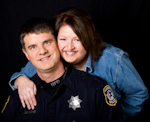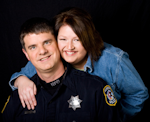Relationship Repairs
We frequently reference how a law enforcement career, the lifestyle it requires, and the certain personality traits commonly found in those who live it can lead to strained and broken relationships. Less frequently, especially lately, have we gone in depth into how to prevent damage to our most important interpersonal relationships, or repair that which may have already occurred.
What we are offering today is a is a 5-step plan designed to begin the process of reconciling failing relationships and to help existing, good or “pretty good” relationships improve or keep going strong.
Own Up
The easiest part of any relationship breakdown is to place blame on the other of how they wronged, hurt, offended or betrayed you. It's easy to come up with that list. What's harder, but more crucial, is to look in the mirror first and foremost to in order to take ownership of what you contributed to the conflict. Looking at our own faults, imperfections, immaturities, anger and how we failed the other person takes courage and a willingness to change.
For instance, marriage counselors know it's not a single event that usually leads a couple to contemplate a divorce, but a series of events and the breakdown is caused by both people, not just one. Even when one person has an affair then, yes, that affair is a reckless betrayal that cuts to the bone, but it's also a symptom of a much bigger problem. There were often many events on both sides of the relationship, such as emotional abandonment, unsafe communication, small frustrations that built to resentment, etc., which led to one person having the affair.
All the dynamics need to be examined and each person needs to take ownership as the first and most crucial step for a relationship to reconcile. Marriage and relationship therapists also know, based upon empirical research, that if one person refuses to take ownership of their part the relationship is destined to fail.
Bring Solutions
This can be one of the most difficult parts of repairing a broken relationship because it requires great vulnerability. Simply pointing out what may be the elephant in the room – we’re not doing well – leaves you susceptible to a wide range of unknowns. How will your partner or family member or friend react? Will you be rebuffed? Rejected? Emotionally pummeled? Will they even give a damn about the prospect of your relationship collapsing or having collapsed?
This can be a hard step for anyone to initiate, and for cops – who are supposed to be emotionally and mentally tough – it can be even harder because it requires you lower walls and defenses carefully constructed over the years. Nonetheless, it's crucial if you're serious about fixing what is broken.
And so is bringing solutions to the table. Merely pointing out what may be quite obvious about how things have weakened or broken isn't enough. Having a plan and suggested solutions demonstrates you're seriousness about rebuilding what’s been lost.
Develop a Plan, Follow Through
Creating a strategy to restore the relationship – first unilaterally, in what you will bring to the table as possible solutions, and then together with any refinements to those solutions, additions the other party may have added, and a sense of teamwork – greatly improves the likelihood of your success.
The plan may or may not be elaborate. If busyness, the passage of time or neglect has caused you to lose touch with your former circle of close friends and you’d like to restore some or all of those bonds, it may be as simple as pledging to get together in person or by phone quarterly to catch up, a conscious effort to include them on your holiday card list or making time to stay connected via social media.
But if you're trying to save a foundering marriage or bridge a familial estrangement, the plan will certainly require far more intricate and vital details. The significance and depth of your potential loss, and the seriousness of what caused the estrangement, will dictate how elaborate your plan must be
And follow-through is critical! No matter your intentions’ sincerity, without follow through they'll be for naught.
Give it time
When a relationship is hurt or broken it almost always requires multiple conversations before real repair begins, and we also need to be willing to listen more than we speak.
Listening is a skill that involves patience to hear everything the other person needs to say. It's only when the other person feels they've been truly heard that healing begins to take place.
Take as much time as the relationship needs to fully mend, which may be years, not days, for two people to reconcile.
Consider Seeking Professional Help
Law enforcement types are often loath to seek the help of a counselor. You’re tough-minded, self-reliant sorts who solve other peoples’ problems, right? Well, sometimes you just need to get over it!
The fact is, when relationships – especially our closest, most intimate relationships that should be lasting a lifetime – have collapsed under the weight of anger, betrayal, distrust and dysfunction, you’re probably just not going to be able to fix them on your own. Some of the prior steps we’ve listed are more easily accomplished with the help of an experienced counselor who can both help you and hold you accountable. Working with someone who does this stuff all the time makes it so much easier to accomplish your goals.
And just because the help your seeking has to do with relationships and relationship-mending doesn’t mean you have to seek professional help together; it’s nice, and maybe helpful, but not always possible. Focusing on yourself and what personal foibles you may bring to your relationships is helpful in its own right, and can keep you focused and sane as you work through the difficult task of restoring a relationship.

Michael Wasilewski
Althea Olson, LCSW and Mike Wasilewski, MSW have been married since 1994. Mike works full-time as a police officer for a large suburban Chicago agency while Althea is a social worker in private practice in Joliet & Naperville, IL. They have been popular contributors of Officer.com since 2007 writing on a wide range of topics to include officer wellness, relationships, mental health, morale, and ethics. Their writing led to them developing More Than A Cop, and traveling the country as trainers teaching “survival skills off the street.” They can be contacted at [email protected] and can be followed on Facebook or Twitter at More Than A Cop, or check out their website www.MoreThanACop.com.

Althea Olson
Althea Olson, LCSW and Mike Wasilewski, MSW have been married since 1994. Mike works full-time as a police officer for a large suburban Chicago agency while Althea is a social worker in private practice in Joliet & Naperville, IL. They have been popular contributors of Officer.com since 2007 writing on a wide range of topics to include officer wellness, relationships, mental health, morale, and ethics. Their writing led to them developing More Than A Cop, and traveling the country as trainers teaching “survival skills off the street.” They can be contacted at [email protected] and can be followed on Facebook or Twitter at More Than A Cop, or check out their website www.MoreThanACop.com.


